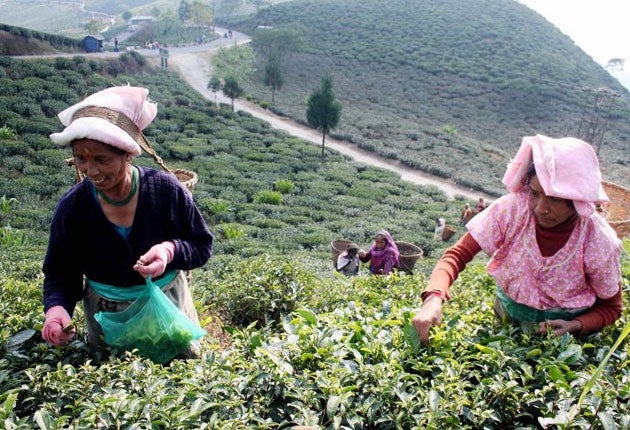Darjeeling – does the champagne of brews really need a new name?
Tea estates face shutdown unless they brand packaging as 'flavour of Gorkhaland'

The tea of Darjeeling is famous around the world. The so-called champagne of brews, the regional variety is prized for its light, delicate taste and soothing aroma.
But estate owners in Darjeeling are under pressure to rebrand their famed tea or face a possible shutdown of production. A separatist movement wishing to create a state for ethnic Gorkhas (or Gurkhas) has demanded that the estates print on their packing the words: "The flavour of Gorkhaland."
If the estates do not go along with the potentially costly rebranding by the deadline of 7 March, they could find themselves effectively shut down by a series of strikes, similar to those which halted production last summer and forced countless tourists to flee.
The demand to use the word Gorkhaland has been made by the Gorkha Janamukti Morcha (GJM), a political group that wishes to create a separate state – but not a separate nation – in the north of what is currently West Bengal. The GJM says that Gorkhas have long suffered discrimination by the local authorities, based in Kolkata.
"The idea is to highlight the movement – the democratic movement of Gorkhaland," said Roshan Giri, the GJM's general secretary. "Darjeeling tea is famous around the world so that name would stay but it would have the words 'flavour of Gorkhaland'."
Mr Giri said the request had been made to the region's estate owners and that if they declined they would be "educated in a democratic way". His organisation has scheduled 7 March for the stepping-up of a "non-co-operation" campaign in which local residents are being urged to refuse to pay local taxes and electricity bills. Last year, a series of strikes by the GJM brought the region to a standstill. While the tea estates were technically not included in the action, the lack of food and fuel had a drastic impact at a crucial time in the growing season.
The GJM feel no sympathy for the estate owners. They claim that, of about 90 estates in Darjeeling, none are owned by Gorkhas and that the Bengali owners simply replaced the British estate holders after the colonisers left in 1947. They argue that the region's one million Gorkhas suffer in terms of access to education, jobs and infrastructure. The estate owners say they will not cede to the separatists' request. "Their demand is a legal issue," said Sanjay Bansal, chairman of the Darjeeling Tea Association. "There is no way we can make the decision. This is something the government would have to do."
Ashok Lohia, owner of one of the largest and best-known estates, Chamong, which dates from 1916, said: "They want a separate state and this is part of their tactics to say the tea is made in Gorkhaland. But until this is legal we will not accept it. The members would not do anything to undermine their status in the long term."
Darjeeling produces about 10 million kg of tea every year, about 7 per cent of the total exported. The industry supports about half of the region's 1.6m people but production has not increased during the past 20 years. The campaign for an independent Gorkha state gathered pace in the 1980s, when 1,200 people died in violence surrounding the breakaway effort.
Peace was eventually secured by the creation of the Darjeeling Gorkha Hill Council, a body meant to provide a degree of autonomous rule for the Gorkhas. But in the 20 years since the creation of the DGHC, many people have apparently become dissatisfied with the Gorkha politicians involved. The GJM was formed as an alternative.
Darjeeling: The facts
*Darjeeling tea is produced in specific locations surrounding Darjeeling town, and cannot be produced anywhere else in the world.
*Tea was first planted in Darjeeling by Dr Arthur Campbell, who planted China tea seeds from Kumaun in 1841 while running the local sanatorium.
*Darjeeling's strength depends on its "flush". First flush, harvested in spring, produces a light aroma, while autumn flush has a fuller flavour.
Join our commenting forum
Join thought-provoking conversations, follow other Independent readers and see their replies
Comments
Bookmark popover
Removed from bookmarks